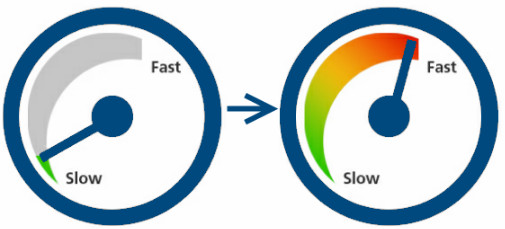If you are a webmaster then you might know that, SEO is affected by various things like speed, quality of content, website down times and make sure it’s not your web hosting that is at fault for your low rankings. The most crucial thing about SEO is to provide as much as value to the users by providing quality content but not to make the Search Engines more happier by throwing hell amount of spam links! Those days are gone and now it is the Era of new “SEO” Rank Brain, the Artificial Intelligence (AI). So you have to play smartly and intelligently in order to harness the power of SEO!
How does web hosting affect SEO?
Not a lot of people are aware of how much web hosting can affect SEO rankings. Many website owners focus primarily on design and content, and while both are important factors, all your efforts come to a naught if your website experiences often down times and takes too long to load.

This article will guide you through choosing the best hosting solution for your website, you’ll learn about what factors to consider and how each can impact your SEO rankings.
Now let’s look into how web hosting might affect your SEO.
Speed
Not only does speed influence your user experience and bounce rates (according to statistics people expect a website to load just under 2 seconds, if not they are likely to leave that page), but search engines also use speed as one of the factors in their ranking algorithms.

Various things may contribute to slow loading time, such as how your website was initially built, whether or not it was properly optimized etc. So before blaming your hosting provider, make sure you’ve excluded everything else from the list of things that could have caused your website to be slow. You can check your website’s speed using one of the analytics tools such as Google Page Speed Insights and GTmetrix.
Web Host Location
Search engines also take in consideration your server’s physical location. So for example, if your server is located in San Francisco, but your business targets London’s market, it’s likely you’ll rank well in San Francisco, but not so much in your targeted location. The further away your host is, the slower the speed can be. Because the requests are processed longer and the data has to travel the physical distance from your server to the user. It’s always better to buy web hosting in your country and as close to your target audience as possible.
Website Down times
Cheap web hosting sounds nice, but it also comes with additional cost not included in the bill. Low-quality hosting providers offer unreliable services, they might promise almost 100% percent up time, however that is an impossible number, every server is bound to come down once in a while. The only question is how often that would happen.

If a search engine spider visits your website and it turns out that it’s down, and that happens quite a few time, you’ll get penalized and your website might actually get excluded from the searches. There’s no point for Google, or Bing, or Yahoo to serve their users a website that is simply not working.
Now that we’d established how web hosting can influence your SEO rankings, we can move on to choosing the best option.
Types of Web Hosting
Just like a hosting provider you choose, the type of web hosting you use is equally important. Could be even more so. There are commonly a few types of web hosting offered such as shared hosting, cloud, VPS and dedicated hosting. While search engines don’t particularly care about what hosting provider you use or the type of web hosting you have, those can affect your speed, downtimes, and in case of shared hosting your reputation, consequently affecting your SEO rankings.
Let’s look into the different types of web hosting typically available and their benefits or disadvantages.
Shared Hosting
With shared hosting your website is hosted on one server along with dozens or even hundreds of other websites. Some hosting providers might even host thousands of website on one server. All the resources like CPU power, RAM, storage etc are shared and while providers might promise you unlimited resources, that’s far from the truth. The low price of shared hosting is what mostly attracts people. However, since all the resources are shared, if one of the websites on the server eats up more resources other websites are affected by it. In addition, all the websites on the shared server share the same IP address, so if one of them is fraudulent it will affect your ranking as well.
Generally, shared hosting is not recommended for websites that have a lot of incoming traffic and experience sudden traffic spikes, as well as require a lot of resources. So if your websites has thousands of visitors per day, and contains a lot of high resolution images, videos and long running scripts, this option is not for you.
VPS
Virtual Private Server, in short VPS, is in a way a shared hosting. A software is ran on the server that creates a number of “mini servers” which operate independently of each other. Each virtual server is assigned its own share of resources, and if it just so happens your site consumes more than you initially thought you’d need, you could ask for additional resources. However, keep in mind that the resources are limited by the actual physical server capabilities. VPS is typically more reliable than shared hosting and offers more customization, but it also means that you’ll be responsible for maintaining your server yourself or you’ll need to hire a professional to do it for you.
VPS is more expensive than shared hosting, but it offers more benefits. If you have a more complex website, I recommend going for VPS hosting at the very least. Your website will run more smoothly and work faster.
Cloud Hosting
Cloud hosting has grown in popularity over the last couple of years. It offers reliability, unlimited storage, bandwidth and flexible scalability. In plain terms cloud hosting is a bunch of servers interconnected between each other, so your data is not hosted on one server. As your website grows and you need more resources they can easily be given to you. Cloud hosting is also known for being resistant to server crashes, but even if one of the servers were to go down, your website would still be up since all the other servers would act as back-up.

Cloud hosting is more expensive than VPS or Shared hosting, however it’s subscription based and you only pay for the resources that you use. One of the downsides of cloud hosting is security, since everything is hosted “virtually” an attacker might hack into cloud hosting and steal all the data, for example. However, cloud hosting providers take measures to prevent that, but you can never be a hundred percent sure of anything. If you’re looking for reliable cloud hosting that would ensure your website is up and running all the time, and you are not as security conscious, consider cloud hosting.
Dedicated Hosting
Dedicated hosting is like leasing an apartment, the whole server is yours and yours only. You can set it up or customize it the way you want and you’re in charge of all the resources. However, that also means that managing it would not be and easy task for a non-technical person, in case anything fails you’ll be on your own. Dedicated hosting is a way to go for a website that might host sensitive information, and receive thousands of users every day and require a considerable number of resources. Typically, dedicated hosting can cost between just a couple of bucks a month to even thousands of dollars.
Deciding on the best web hosting for SEO
Once you’ve decided with what web hosting you want to go with, now is actually the hardest thing, you need to choose a good provider. You can’t exactly do an analysis of how the server will perform or what the customer support is going to be like. You want to choose a reputable hosting provider from the get go, since moving hosting later on will require a lot of time, effort and money on your part.
Below a couple of tips to help you make your decision.
Read the reviews at first then decide

A simple Google search will yield you dozens of websites with reviews about the web hosting company, but also dozens of those are going to be affiliate websites, try to avoid those. One of the good neutral websites is WebHostingGeeks, also look at reviews on forums such as WebHostingTalk or even Reddit. It’s impossible for a provider to be without faults, however some things matter less in their degree of severity such as complains about not being able to install the software correctly, not knowing how to use it etc. Pay attention to reviews that mention server crashes, database losses, hacking and Google penalties, those are the important ones.
Choose local host
I’ve already mentioned that the server’s location plays its role in your websites speed and also SEO rankings. Choose a web server of the country you and your target audience are in, the closer the better.
Compare specs and additional features
Speed: Get an idea about the server’s speed using PickupHost.
Hardware: Compare the resources of the server such as storage, RAM and CPU power. If the provider not transparent about those things, they are not worth your while.
Additional features: Compare the additional features that come in a package, like free domain, on click installs or CDN (is a must for high traffic websites). And pay no attention if they offer a free website builder, since they are usually not that good, plus proprietary meaning if you were to move hosting you’ll have to redesign and rebuild your website all over again yourself. Stay away from providers that offer “search engine visibility”, it’s complete bogus. Any website that is public should be visible to search engines.
Bandwidth: Most of the providers offer unlimited bandwidth, but always read the fine print, since that is usually not the case at all.
Take your time making a decision, a suitable web hosting type and good hosting providers will save you money, effort and time in the long run.



Hi Minhaj,
This post is very essential for the newbies especially. Thanks a lot for sharing an informative article. Keep it up!